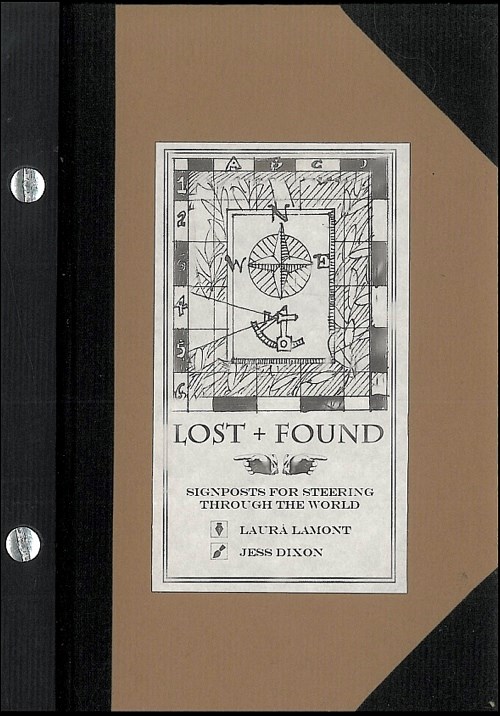Written by Laura Lamont, Designed by Jess Dixon
Published by Jackpine Press
ISBN 978-1-927035-18-4 $30.00
In 2015, Saskatoon’s Jackpine Press published Lost + Found: Signposts for Steering Through the World, and the good news for the press and the book’s creators is bad news for you, readers: each of the 75 copies of this limited-edition, hardcover (millboard wrapped in craft paper, bound with fabric tape and snapped together with Chicago bolts) has already found a home. Usually one reviews books that are new and available, but it’s also worthwhile to examine a success story and introduce readers to the writer so they can watch for future works.
Let’s begin with this book’s eclectic design. If it were a painting, I’d suggest its closest to collage. If it were music, it would be jazz. Inset location diagrams represent individual poems and appear as background to each poem’s text. Imprinted cotton paper; cascading, torn vellum; a post-it-style note (that protrudes outside the book’s neat and expected rectangle); apparent “scrap paper;” and pages that are coffee-cup ringed and wrinkled are all fair game for hosting poems in this little marvel of a book.
Most of us probably read a back cover before we start a book proper. There’s no blurb here, nor an author bio, which can be either disconcerting for a reader or allow them the freedom to experience the work completely without context. And what is one to make of the disparate materials, fonts (“radio silence” is printed in a typewriter font), and images?
Usually a book’s title offers at least a small clue, so before I discuss the content, let’s examine that title: Lost + Found: Signposts for Steering Through the World. It suggests the world requires maps\directions\signposts (perhaps because it’s physically\emotionally convoluted), that one can easily get lost, but just as easily, found . The poems, then, would be the “signposts”.
The first piece (a few lines on each of four pages, printed on onionskin) is called “Cromniomancy,” and that title had me scrambling for a dictionary: “Divination by onions or onionsprouts.” Wow, didn’t expect that. This initial poem, and those that follow, trace a first-person narrator’s journey away from a troubled past, where “skin keeps a record, every\cut and bruise archived on vellum,” and through the tremulous territory that is a new relationship.
Melancholy is clearly present in these poems. In “radio silence,” a poem first published in the esteemed journal Contemporary Verse 2, we read “No more lying\in bed, loneliness bleeding out\in silent waves beside someone\whose face was closed to me.” An inability to read others’ “signposts” is also present. The poet writes of “guessing at\other people’s ciphers and codes” (from “Diversions”), and says “can’t pin your face\on a wall, fit you to a scale\or give you a legend.” (from “Mapping Your Body”)
Though the terrain is rocky, ultimately the subjects in this gorgeous collection “fuse in heat and\flicker as one flame.” The poems and the story they collectively tell have me wondering, do we ever really know another person, or even ourselves? Lamont’s poetry is a looking glass.
This book is available at your local bookstore or from the saskatchewan publishers group www.skbooks.com.



